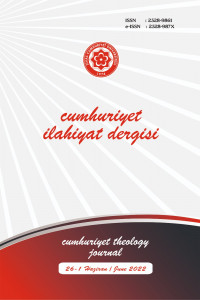Mâlikî Mezhebinde Namazda Setr-i Avret Şartı İle İlgili Yaklaşımlar
Approaches to the Principle of Satr al-Awrah in Prayer in the Mālikī School of Law
Author(s): İbrahim YılmazSubject(s): Law, Constitution, Jurisprudence, Islam studies, Sociology of Religion, Sharia Law
Published by: Cumhuriyet Üniversitesi İlahyat Fakültesi
Keywords: Islamic Law; Fiqh; Mālikī Sect; Prayer; Satr al-awrah; Hijāb;
Summary/Abstract: Satr al-awrah is one of the obligatory provisions for men and women in Islam. Satr al-awrah, as a religious/jurisprudential term, means covering the parts of the body that should be covered by religion (ʿawrah). Muslim jurists have disagreed on whether satr al-ʿawrah is a condition of validity for prayer. Setr-i awret is divided into two as awret-i mugalleza (rough private parts) and ʿawrah mukhaffafa, (light private parts). In the classical fiqh doctrine, there are two basic approaches, one belonging to the jumhūr (including the Hanafī, Shafiī and Hanbalī schools) and the other to the Mālikīs, related to the fact that the satr al-ʿawrah is a validity condition for the prayer. According to the majority (jumhūr), without distinction as ʿawrah mughallaẓa and ʿawrah mukhaffafa, satr al-awrah constitutes a validity condition for the prayer. Therefore, a prayer performed without fulfilling the satr al-awrah condition is not valid. A prayer performed in this way must be re-performed absolutely within or outside of time. In terms of whether the prayer is validly performed or not, in the Mālikī school, satr al-ʿawrah is divided into two as ʿawrah mughallaẓa (covering the coarse ʿawrah parts) and ʿawrah mukhaffafa (covering the light ʿawrah parts). There is an agreement that covering the ʿawrah mukhaffafa is not a validity condition for prayer. Therefore, in the Mālikī school, the disagreement about whether the satr al-ʿawrah constitutes a condition of validity for prayer relates to covering the ʿawrah mughallaẓa. In this context, the approaches in the Mālikī school about whether the satr al-ʿawrah is a validity condition for prayer differ from the approach of the jumhūr (including the Hanafī, Shafiī and Hanbalī schools) who say that satr al-ʿawrah is a validity condition for prayer, without making any distinction between ʿawrah mughallaẓa and ʿawrah mukhaffafa in terms of nature. According to this, there are two approaches in the Mālikī school regarding whether the satr al-ʿawrah (covering the ʿawrah mughallaẓa) is a necessary condition for prayer. According to the first approach, satr al-ʿawrah (covering the ʿawrah mughallaẓa) is a necessary condition for prayer. Therefore, a prayer performed without fulfilling the condition of covering the ʿawrah mughallaẓa is not valid. A prayer performed in this way must be re-performed absolutely within or outside of time. This approach is partly the same as jumhūr’s approach. According to the second approach (without any distinction between prayer and non-prayer), satr al-ʿawrah is a general obligation in Islam. Therefore, satr al-ʿawrah is also not a validity condition for prayer. According to this second approach, it is sunnah to comply with the satr al-ʿawrah in prayer. Whoever abandons the satr al-ʿawrah in prayer commits a haram and sin because he does not comply with a certain religious rule in Islam. Although it is mustahab to re-perform the prayer in due time, it is not obligatory to re-perform it after the time has passed. Because it is done during the prayer time. When the approaches put forward in the Mālikī school regarding whether a satr al-ʿawrah is a necessary condition for prayer are examined, it is seen that views of those who say that satr al-ʿawrah is a must are stronger and more accurate. Because the fact that satr al-ʿawrah, which is obligatory outside of prayer/in normal life, is not a condition/obligatory in prayer, contradicts the spirit of servitude and prayer. As a matter of fact, Mālikī jurist Ibn al-Arabi, based on the evidence that orders satr al-ʿawrah in prayer, says that although satr al-ʿawrah is a general fard (religious duty) in Islam, it should be a stronger fard in prayer. As a matter of fact, as it can be understood from the information given in Mālikī works/sources on the subject, the view preferred by the majority in Mālikī school is that satr al-ʿawrah (ʿawrah mughallaẓa) is a necessary condition for prayer. The disagreement in the classical fiqh doctrine about whether the satr al-awrah is a condition of validity for the prayer has some jurisprudential consequences. As a matter of fact, according to the majority, whether it is ʿawrah mughallaẓa or mukhaffafa, a prayer performed with an uncovered awrah is not valid and must be re-performed absolutely. In the Mālikī school, there are different opinions depending on whether it is ʿawrah mughallaẓa or mukhaffafa. If the place uncovered on the body is ʿawrah mughallaẓa; according to those who accept the satr al-awrah as a condition for the validity of the prayer, the prayer is not valid and must be re-performed absolutely. After the time has passed, the prayer does not have to be repeated. If the place uncovered on the body is ʿawrah mukhaffafa, according to all Mālikīs, unanimously the prayer is valid. Although it is recommended to reperform it in time, it is not required to be repeated after the time has passed. The following can be said about the practical examples of the disagreement in the classical fiqh doctrine regarding whether the satr al-awrah is a condition for the validity of the prayer, especially in terms of ʿawrah mukhaffafa, according to Mālikīs, who do not accept the validity of the satr al-awrah for prayer, it is valid for women to pray with their heads down, below the knees and with their arms uncovered. Again, according to them, it is valid for men to perform prayers with their thighs and hips (fakhz) uncovered, since it is considered one of the private parts.
Journal: Cumhuriyet İlahiyat Dergisi
- Issue Year: 26/2022
- Issue No: 1
- Page Range: 303-320
- Page Count: 18
- Language: Turkish

